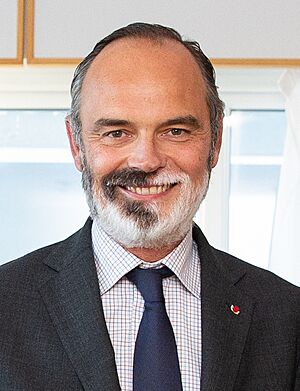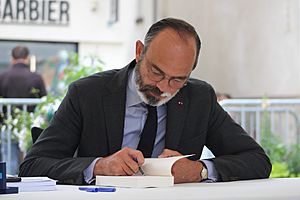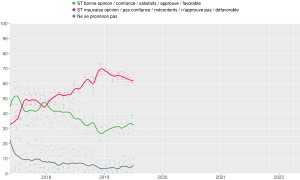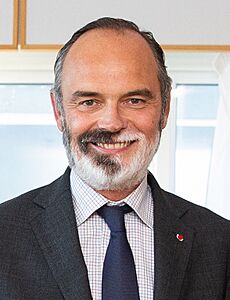Édouard Philippe facts for kids
Quick facts for kids
Édouard Philippe
|
|
|---|---|

Philippe in 2021
|
|
| President of Le Havre Seine Métropole | |
| Assumed office 5 July 2020 |
|
| Preceded by | Jean-Baptiste Gastinne |
| Mayor of Le Havre | |
| Assumed office 5 July 2020 |
|
| Preceded by | Jean-Baptiste Gastinne |
| In office 23 October 2010 – 20 May 2017 |
|
| Preceded by | Antoine Rufenacht |
| Succeeded by | Luc Lemonnier |
| Prime Minister of France | |
| In office 15 May 2017 – 3 July 2020 |
|
| President | Emmanuel Macron |
| Preceded by | Bernard Cazeneuve |
| Succeeded by | Jean Castex |
| Member of the National Assembly for Seine-Maritime's 7th constituency |
|
| In office 23 March 2012 – 15 June 2017 |
|
| Preceded by | Jean-Yves Besselat |
| Succeeded by | Jean-Louis Rousselin |
| President of the Agglomeration community of Le Havre |
|
| In office 18 December 2010 – 25 June 2017 |
|
| Preceded by | Antoine Rufenacht |
| Succeeded by | Luc Lemonnier |
| Personal details | |
| Born |
Édouard Charles Philippe
28 November 1970 Rouen, France |
| Political party | Horizons (since 2021) |
| Other political affiliations |
PS (1990s) UMP (2002–2015) LR (2015–2017) |
| Spouse | Édith Chabre |
| Children | 3 |
| Education | Lycée Janson-de-Sailly |
| Alma mater | Sciences Po École nationale d'administration |
| Profession | Lawyer |
| Signature |  |
Édouard Charles Philippe (born 28 November 1970) is a French politician. He is currently the mayor of Le Havre, a city in France. He held this role from 2010 to 2017 and again since 2020.
From 2017 to 2020, Édouard Philippe served as the Prime Minister of France. He worked under President Emmanuel Macron during this time. Before becoming Prime Minister, he was a lawyer. He was also a member of the National Assembly, which is like France's parliament.
As Prime Minister, he helped pass new laws about work and taxes. He also played a key role in France's response to the COVID-19 pandemic in France. After leaving the Prime Minister's job, he became mayor of Le Havre again. In 2021, he started a new political party called Horizons.
Contents
Early Life and Education
Édouard Philippe was born in Rouen, France, in 1970. His parents were both teachers. He grew up in a family with a history of dockworkers.
He went to school in Rouen and nearby towns. He earned his high school diploma in Bonn, Germany. Later, he studied at two famous French schools: Sciences Po and the École nationale d'administration (ÉNA). These schools are known for training future leaders.
In 1994, Philippe served as an artillery officer in the military. After finishing his studies in 1997, he worked as a lawyer. He specialized in public procurement law at the Council of State.
Political Journey
In 2001, Édouard Philippe started his political career in Le Havre. He became the Deputy Mayor, helping with legal matters. He worked with Antoine Rufenacht, who was the mayor at the time.
Philippe joined the Union for a Popular Movement (UMP) party in 2002. This party later became The Republicans (LR). He worked for the UMP until 2004. He then worked in the private sector for a few years.
In 2007, he briefly returned to politics. He worked for Alain Juppé, who was a government minister. From 2007 to 2010, he worked for a company called Areva.
Mayor of Le Havre
In 2010, Édouard Philippe was elected mayor of Le Havre. He also became the President of the Agglomeration community of Le Havre. This role involves leading a group of towns around Le Havre.
In 2012, he became a member of the National Assembly. He represented the 7th area of Seine-Maritime. He was reelected as Mayor of Le Havre in 2014. He stepped down as mayor in 2017 when he became Prime Minister. However, he kept a seat on the city council.
2017 Presidential Election
In 2016, Philippe supported Alain Juppé in the primary election for the Republican party. After Juppé lost, Philippe joined François Fillon's campaign for the 2017 French presidential election. However, he left Fillon's campaign in March 2017 due to some issues.
After Emmanuel Macron won the presidential election, many people thought Philippe might become the new Prime Minister. He was seen as a good choice because he was young (46), from the center-right, and understood local politics.
Becoming Prime Minister
On 15 May 2017, President Emmanuel Macron officially appointed Édouard Philippe as the Prime Minister of France.
In the 2017 French legislative election, Macron's party, La République En Marche! (LREM), and its allies won a large majority of seats. Even though Philippe was still a member of The Republicans, he supported LREM because they backed his role as Prime Minister.
He formed his government on 21 May 2017. On 4 July 2017, he received a vote of confidence from the parliament. This meant he had enough support to lead the government.
Key Actions as Prime Minister
Philippe announced plans to reduce France's debt. This included raising cigarette taxes and cutting government spending. He also planned to lower corporate tax for businesses.
His government worked on changing labor laws. These changes aimed to give companies more flexibility in how they work with employees. This was a major economic reform promised by President Macron.
On 12 July 2017, Philippe announced a new plan for immigration. The plan aimed to speed up asylum claims and provide housing for refugees.
On 3 July 2020, Édouard Philippe resigned as Prime Minister. Soon after, he successfully ran for mayor of Le Havre again. In 2024, he announced his intention to run for president in 2027.
Personal Life
Édouard Philippe is married to Édith Chabre. She is an executive director at the School of Law at Sciences Po. They have three children together.
Since the mid-2010s, Philippe has had a short beard. He is the first French Prime Minister with a full beard in over a century. He is also one of the few Prime Ministers in the last 100 years to be older than the president he served.
Philippe has shared that he has vitiligo, a skin condition that causes white patches on his skin and hair. He also announced in 2023 that he has alopecia areata, which causes hair loss.
He enjoys boxing as a regular hobby.
Awards and Recognition
| Ribbon bar | Honour | Date and comment |
|---|---|---|
| Grand Cross of the National Order of Merit | 22 November 2017 – by right as Prime Minister | |
| Grand Officer of the Order of the Legion of Honour | 2020 |
International Awards
| Ribbon bar | Country | Honour | Date |
|---|---|---|---|
| Australia | Honorary Officer of the Order of Australia | 11 November 2018 | |
| Senegal | Grand Cross of the Order of Merit | 2019 |
Published Works

Édouard Philippe has co-written two fiction books:
- Dans l'ombre (In the Shadow)
- Des hommes qui lisent (Men Who Read)
These books are political thrillers. They tell stories about presidential elections with twists and turns.
In 2015, Philippe wrote the introduction for a book called Promenades avec Oscar Niemeyer by Danielle Knapp.
See also
 In Spanish: Édouard Philippe para niños
In Spanish: Édouard Philippe para niños
 | Bessie Coleman |
 | Spann Watson |
 | Jill E. Brown |
 | Sherman W. White |



